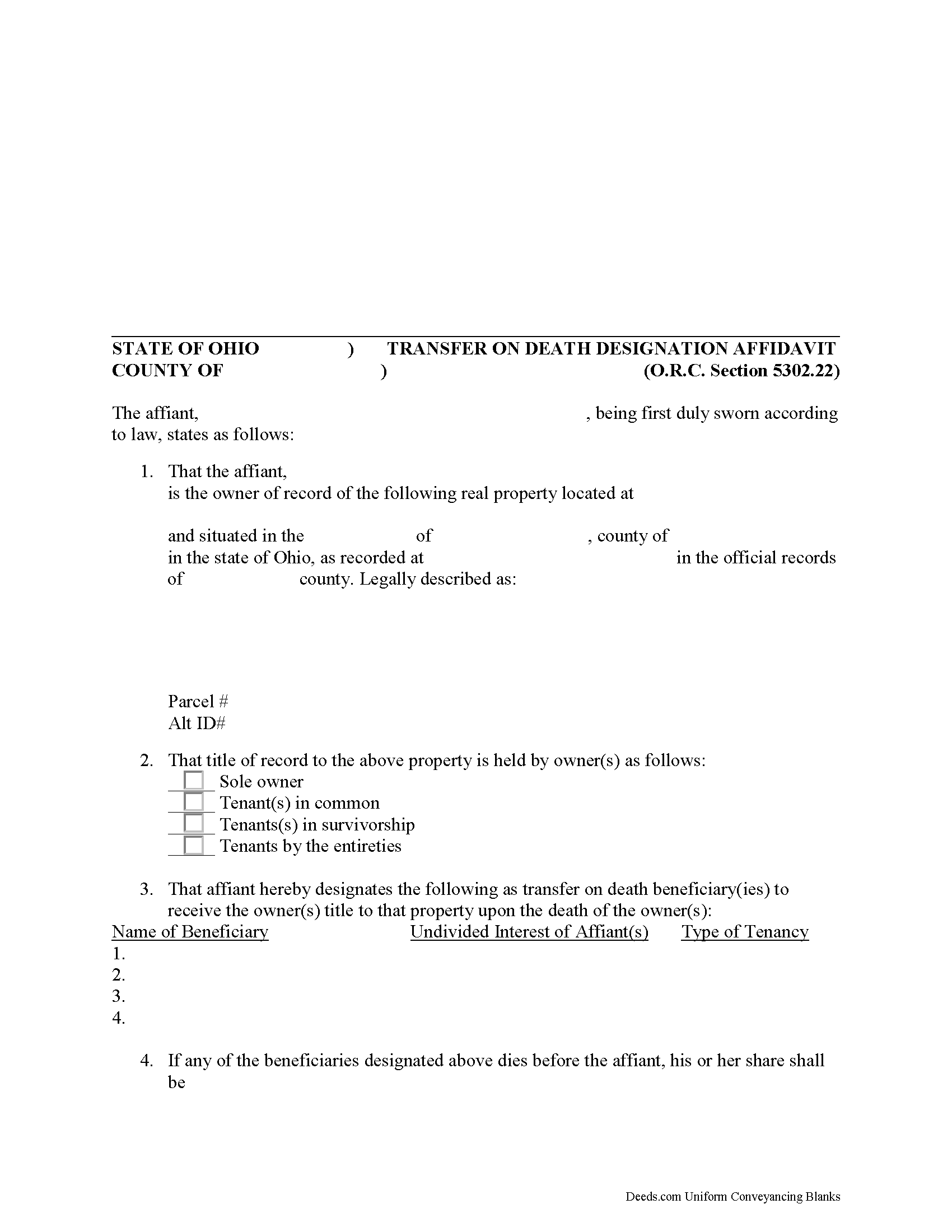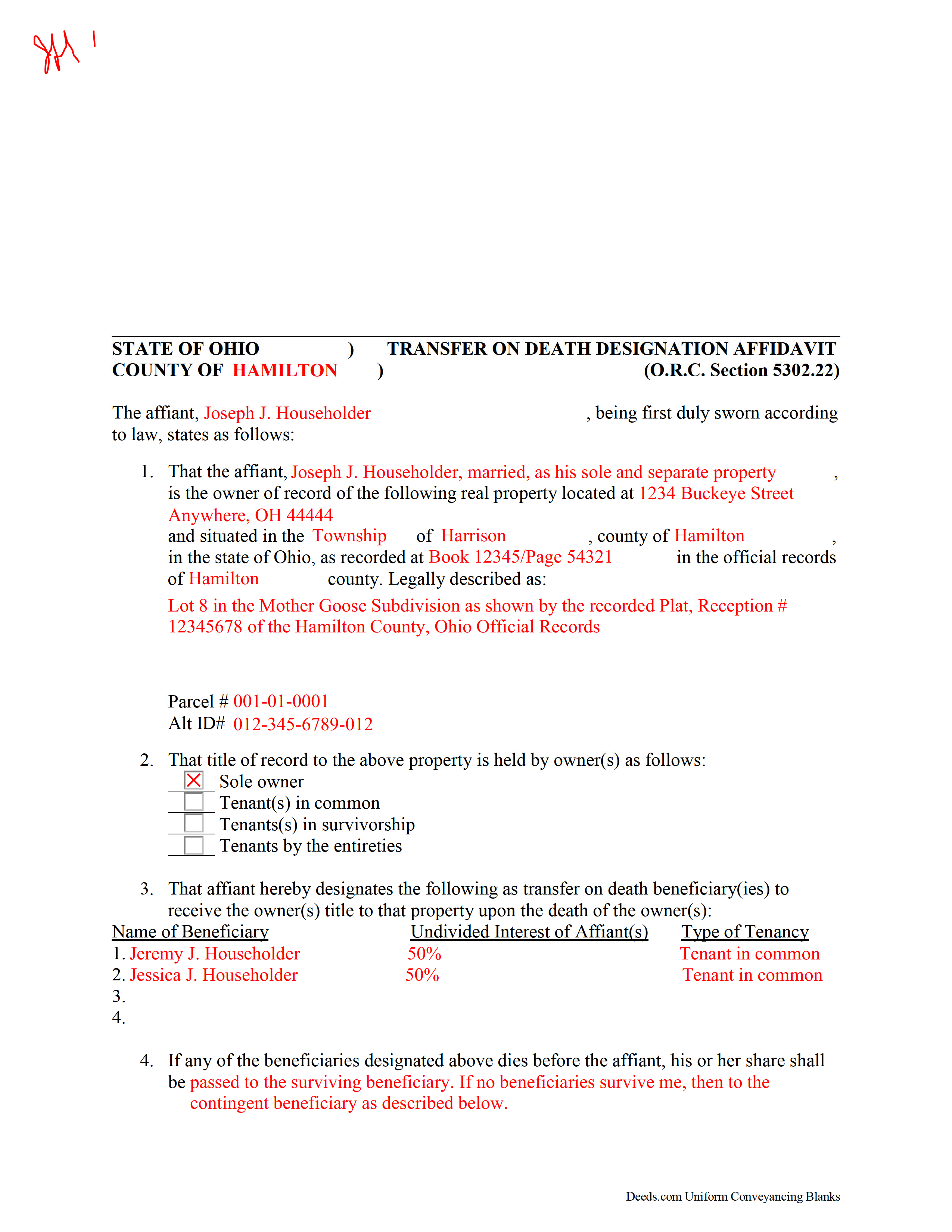


Example of a properly completed form for reference.
Included Montgomery County compliant document last validated/updated 9/16/2024
451 W Third St / PO Box 972, Dayton, Ohio 45422-1387
Hours: 8:00 a.m. - 5:00 p.m. Monday - Friday / Documents recorded 8:00 – 4:00
Phone: (937) 225-4275
Forms are available immediately after submitting payment.
Immediately after you submit payment, the Montgomery County forms you order will be available for download directly from your account. You can then download the forms to your computer. If you do not already have an account, one will be created for you as part of the order process, and your login details will be provided to you. If you encounter any issues accessing your forms, please reach out to our support team for assistance. Forms are NOT emailed to you.
This indicates the most recent date when at least one of the following occurred:
Yes. Our form blanks are guaranteed to meet or exceed all formatting requirements set forth by Montgomery County including margin requirements, content requirements, font and font size requirements.
Yes. You can re-use the forms for your personal use. For example, if you have more than one property in Montgomery County that you need to transfer you would only need to order our forms once for all of your properties in Montgomery County.
Often when a deed is recorded, additional documents are required by Ohio or Montgomery County. These could be tax related, informational, or even as simple as a coversheet. Supplemental forms are provided for free with your order where available.
All of our Montgomery County Transfer on Death Designation Affidavit forms are PDFs. You will need to have or get Adobe Reader to use our forms. Adobe Reader is free software that most computers already have installed.
You will need to have Adobe Reader installed on your computer to use our forms. Adobe Reader is free software that most computers already have installed.
No. The blank forms are downloaded to your computer and you fill them out there, at your convenience.
Yes, you can save your deed form at any point with your information in it. The forms can also be emailed, blank or complete, as attachments.
No. Nothing to cancel, no memberships, no recurring fees.
Authorized under section 5302.22 of the Ohio Revised Code, the Transfer on Death Designation Affidavit (TDDA) allows owners of real estate situated in Ohio to plan the conveyance of their property to designated beneficiaries after their death. The conveyance occurs separately from a will and without the need for probate. These instruments are known in other states as transfer on death deeds, beneficiary deeds, or Lady Bird deeds, and all fall under the heading of Non-probate Transfers on Death.
TDDAs are useful estate planning tools, because unlike "regular" deeds (warranty, grant, quitclaim, etc.), which permanently transfer the owner's interest in the property, the grantor retains full ownership and control of the property while alive, and may change the beneficiaries, modify the terms, or even sell the property with no restriction or penalty. This flexibility is possible because the grantor accepts no consideration from any of the beneficiaries.
In addition to meeting all state and local standards for recorded documents, TDDAs must include a statement by "the individual executing the affidavit that the individual is the person appearing on the record of the real property as the owner of the real property or interest in the real property at the time of the recording of the affidavit and the marital status of that owner." Married owners must include a statement by "the owner's spouse stating that the spouse's dower rights are subordinate to the vesting of title to the real property or interest in the real property in the transfer on death beneficiary or beneficiaries designated in the affidavit" (RC 5302.22(D)(3)). It must also designate "one or more persons, identified by name, as transfer on death beneficiary or beneficiaries" ( 5302.22(D)(4)).
File the completed and notarized affidavit for recording in the county where the property is located. NOTE THAT THE AFFIDAVIT IS ONLY VALID WHEN SUBMITTED FOR RECORDING WHILE THE GRANTOR IS STILL ALIVE.
The transfer of property rights is completed when the owner dies and the beneficiary completes and records an affidavit of confirmation under R.C. 5302.222.
Using this instrument might affect tax obligations or eligibility for certain income or asset-dependent programs. Please contact an attorney with questions about this or any other issues related to estate planning or transferring real property in Ohio.
(Ohio Transfer on Death Designation Package includes form, guidelines, and completed example)